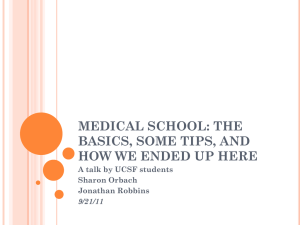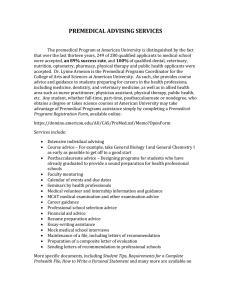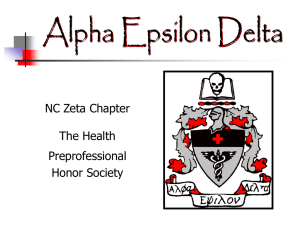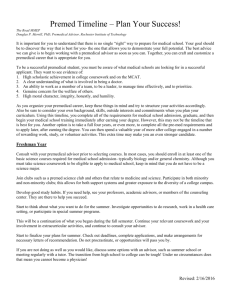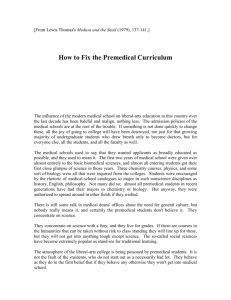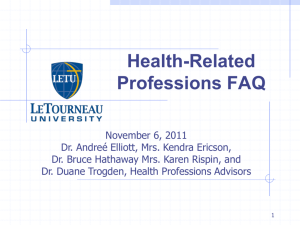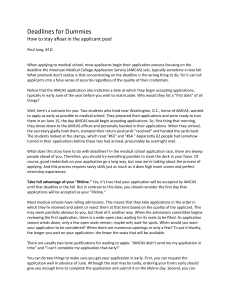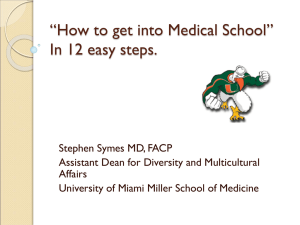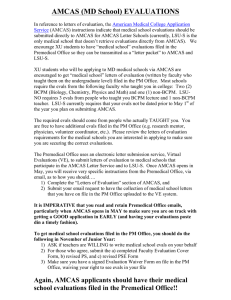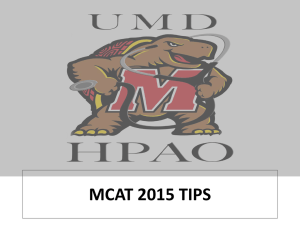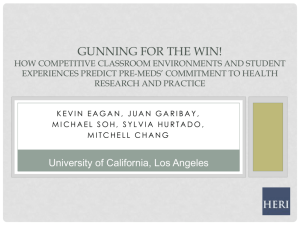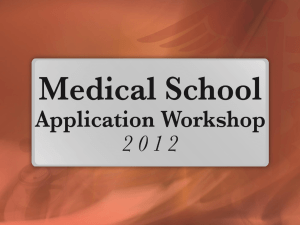Navigating Med School Admissions
advertisement
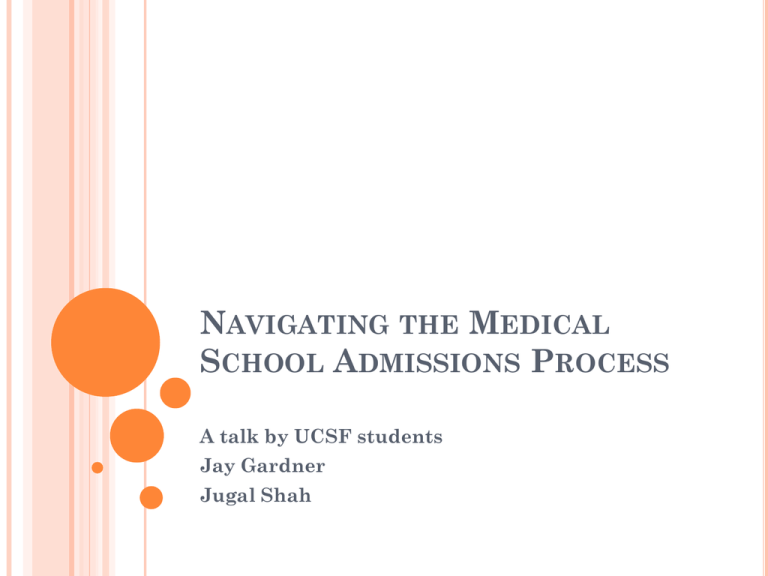
NAVIGATING THE MEDICAL SCHOOL ADMISSIONS PROCESS A talk by UCSF students Jay Gardner Jugal Shah OUTLINE About Us Our Aim About medical school Logistics of Applying to Medical School Resources Questions ABOUT US 3rd Year UCSF Medical Students In Salinas at Natividad Medical Center, currently completing our Family Medicine clerkship AIMS Using the resources of rotating medical students at Natividad Medical Center, we would like to create a sustainable premedical and pre-health advising organization at CSUMB We are here to help! We also want to work together with the CSUMB campus community to figure out what you want and need from your health career advising. IS MEDICAL SCHOOL RIGHT FOR ME? Some questions to ask yourself: Do I care about other people, their problems, and their pain? Do I enjoy helping people with my skills and knowledge? Do I enjoy learning, gaining new understanding? Do I often dig deeper into a subject than my teacher requires? Do I understand the value of learning beyond just making good grades? Am I interested in how the human body functions? Am I intrigued by the way medicine can be used to improve life? ABOUT MEDICAL SCHOOL Required on the path to becoming a doctor 4 years total – 2 years classroom learning, 2 years clinical clerkships Three licensing exams – Step 1 (taken after Year 2), Step 2 (taken after Year 3), and Step 3 (taken after intern year) Followed by residency which varies on length depending on specialty Family medicine, internal medicine, pediatrics – 3 years General surgery – 5 years Surgical subspecialties – 7+ years ABOUT MEDICAL SCHOOL Is it hard? Do you have free time? Is it competitive? Are people nice? What’s the anatomy lab like? What if I don’t like blood? GENERAL PREMED REQUIREMENTS A year of Chemistry along with the appropriate laboratory courses A year of Organic Chemistry along with laboratory courses A year of Biology along with laboratory courses A year of Physics along with laboratory courses A year of English A year of Calculus or other advanced math classes, including Statistics MCAT: computerized, multiple-choice test Offered monthly at Prometric testing sites throughout the country Four sections: Verbal Reasoning, Physical Sciences, Writing Sample, and Biological Sciences SAMPLE TIMELINE FOR APPLICATION DIRECTLY AFTER UNDERGRADUATE STUDIES First and second year – finish premedical requirements, participate in prehealth activities such as volunteering, research, Third year – continue prehealth activities, maintain a strong GPA, take MCAT, and find recommenders Summer after third year – apply online using the AMCAS, the earlier the application is submitted, the better! Fourth year – Secondary applications, received invitations to interview, matriculate by May 15 ALTERNATIVE TIMELINE Most medical students have taken at least one year between undergraduate studies and medical school If premedical requirements have not been satisfied during undergraduate studies, they can be completed with post baccalaureate studies This time off can be used to strengthen your application – activities such as working in a medical field, Teach For America, MPH, Research, Volunteer work, and travel abroad have all been components of successful applications ABOUT THE AMCAS The AMCAS (American Medical College Application Service) is a common online application used by all medical schools during the application process Required sections include Undergraduate transcript Activities & Awards Personal statement explaining desire to go to medical school Secondary applications vary by school Questions tailored to school Short answer questions about ethics FINANCIAL AID Medical school tuition generally costs $50k per year Most schools offer financial aid The federal government offers loans through the Stafford program, which don’t have to be paid back until after graduation and accrue interest with a fixed, subsidized rate Physician salaries depend on specialty, but here are some averages: Family practice: $204k Pediatrics: $175k Emergency Medicine: $216k General surgery: $291k Radiology $354k What are my chances of getting in? GENERAL ADVICE Talk to as many people who have navigated this process before – it’s full of intricacies that are not mentioned by the official sources (i.e. the importance of sending in applications early) Find a physician who will allow you to shadow them Plan ahead and be aware of deadlines early, but don’t panic about missing them. There is much time to get into medical school A BROAD RANGE OF OPTIONS IN HEALTH CAREERS Osteopathic Medicine (4 yrs plus residency) California - Touro and Western Medical College Nursing (varies) Physical Therapy (3 yr program) Dentistry (4 yr program) Pharmacy (4 yr program) Physician Assistant (2 yr program) Veterinary (4 yr program) Optometry (4 yr program) Medical Social worker (2 yr program) RESOURCES UCSF Medical Students – ucsfsalinasmedstudent@gmail.com aamc.org Medical School Admissions Requirements (MSAR) Official website of the Association of American Medical Colleges Official annual publication; details the medical admissions process, the MCAT, and provides information on each individual school. Studentdoctor.net Valuable messageboard for premedical advice on all topics RECOMMENDED BOOKS House of God by Samuel Shem Mountains Beyond Mountains by Tracy Kidder When the Air Hits Your Brain: Tales of Neurosurgery by Frank Vertosick Complications and Better by Atul Gawande The Doctor Stories by William Carlos Williams The Spirit Catches You and You Fall Down by Anne Fadiman The Man Who Mistook His Wife for a Hat by Oliver Sacks QUESTIONS?
